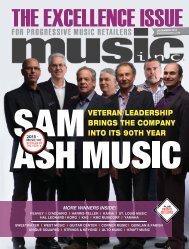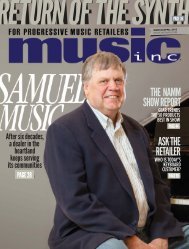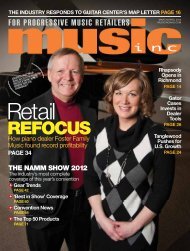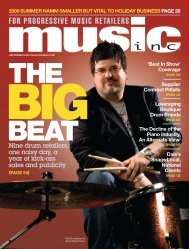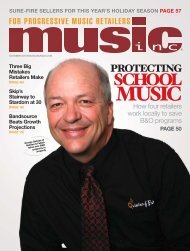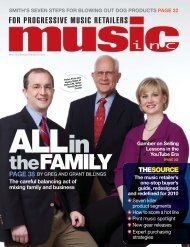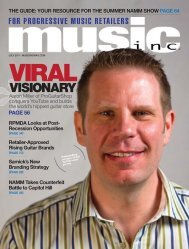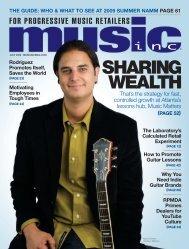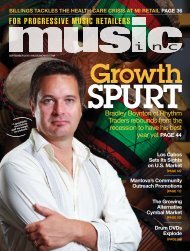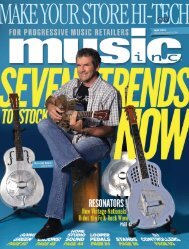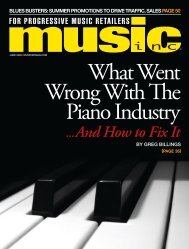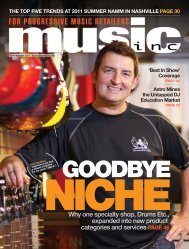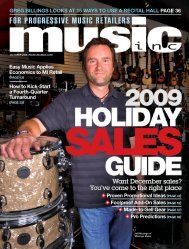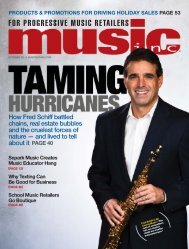BOUTIQUE - Music Inc. Magazine
BOUTIQUE - Music Inc. Magazine
BOUTIQUE - Music Inc. Magazine
You also want an ePaper? Increase the reach of your titles
YUMPU automatically turns print PDFs into web optimized ePapers that Google loves.
10 I MUSIC INC. I JANUARY 2011<br />
PErSPEcTiVE i By ZacH PHilliPS<br />
NEW OWNERS SURF<br />
THE UNExPECTED<br />
Not surprisingly, the recession unleashed a flurry of hardship upon<br />
music retailers — closures, cutbacks, sales declines. Turns out it also<br />
produced a less-expected outcome: new music stores. Lots of them.<br />
<strong>Music</strong> <strong>Inc</strong>. profiled a sample of these dealers during the past two<br />
years. They’re the entrepreneurs who found a steal on a lease, bought<br />
a floundering company or just decided that there was no right time to open shop.<br />
Recently, I asked a half-dozen of the best and brightest<br />
newcomers about the state of business, and whether<br />
owning a store is what they’d expected it would be.<br />
Their responses were remarkably similar — and a<br />
telling sign of the times.<br />
Nearly all agreed running a music dealership<br />
has been much more difficult than they’d anticipated,<br />
especially those who picked up an existing<br />
company. Anthony Mantova was among this group.<br />
He purchased Two Street <strong>Music</strong> in September 2009<br />
and has since brought the Eureka, Calif., retailer back<br />
from near-bankruptcy. Still, this required rebuilding<br />
his inventory from scratch and performing a complete<br />
store renovation.<br />
Joe Summa purchased Greenwich <strong>Music</strong> of Riverside,<br />
Conn., in October 2008, a month after the Fannie<br />
Mae/Freddie Mac debacle. As he put it, “sales fell<br />
off the face of the earth” the day after he closed the deal, and he immediately<br />
had to cut staff and product lines.<br />
Likewise, most of these new retailers said they’ve had to perform<br />
drastic alterations to their original business models — and quickly.<br />
Summa’s model, for instance, had been full-line retail first, lessons and instrument<br />
rentals second. He’s since flipped that around.<br />
“This past year, I think lessons and rentals are going to account for more<br />
than retail for the first time,” he said. “And I’m ecstatic about that.”<br />
The Laboratory of Deptford, N.J., which opened in 2007, didn’t feel a<br />
downturn until this past spring. To combat it, co-owner Steve Delaney, like<br />
Summa, said he’s refocused on expanding his rental business by reaching<br />
out to more school music educators. Plus, he’s cut staff and scaled back the<br />
store’s square footage to nearly half its original size.<br />
Most of the retailers also agreed to being pleasantly surprised<br />
by how much customers value good service.<br />
“I’m really starting to see where being an independent dealer, spending<br />
time with people and sort of befriending them can go a long way,” Summa<br />
said. He even mentioned that customers will regularly thank him for being<br />
around after they’ve shopped at chain music stores.<br />
Phillip Jordan, who runs four-year-old Wilson, N.C.-based RedPhish <strong>Music</strong><br />
(profiled on page 15), was ahead of the curve. “I did expect service and attention<br />
to customer wants and needs to be a key to success,” he said. “I thought<br />
there was a market for that, and it’s turned out to be the case.” MI



